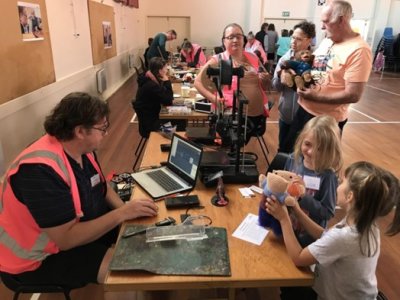Ōtaki Repair Café - Volunteer Story Celebration 2024

Every time I go to an Ōtaki Repair Café I come away feeling good. Repair Cafés stand out as being volunteer services where many volunteers pull together to engage many members of the public, in regular sessions (every 3 months for us here in Ōtaki).
The mission is to help change the ‘throwaway’ mindset - and instead encourage and teach people how to repair items instead, thereby saving energy, resources, reducing climate emissions, and building community. I know lots of people in Ōtaki who now save up items for Repair sessions that they would otherwise have thrown away (or have had beloved keepsakes and heirlooms restored).
This is probably true for the many Cafés now springing up around Aotearoa. I nominate the Ōtaki Repair Café volunteers because, lead by the passionate and proactive Hannelore Wagner-Nicholls, they are not only Kãpiti’s first regular Repair Café (starting in 2019) but have been active in sharing their start-up know-how to support other Cafés’ beginnings, and are active participants in the nationwide Repair movement. The strong emphasis on sharing and collaboration is completely suited to their mission - and it would be great to have it recognised and celebrated.
Now that Ōtaki Repair Café is tallying its ‘savings’ it’s easy to show benefits.
For example, over the 4 Cafes in 2023, 92 volunteers ‘saved’ 143 kg of waste. This equates to saving 11,363 kg of carbon dioxide emissions.That’s the same as planting 190 trees, and all the carbon dioxide those trees absorb in their first ten years’ growth. How was this achieved? The volunteers contributed over 400 hours of their time to the community. They fixed 474 items at a success rate of 85%.
This year is stacking up to be even more successful.
Smaller impacts can be harder to quantify - but here’s an example. As I take photos at Ōtaki Repair Café, I’m lucky to hear some of the repair stories firsthand. Here’s a good one. While most of the items repaired are for practical use, some are brought in for tender-hearted reasons. ‘Monkey’ was Rowena’s beloved toy fifty years ago. In a beautiful coordination of eras, this year the 3d printer team printed Monkey a new paw. Visitors were fascinated!
It illustrated the potential to repair more ‘hands-on’ items like vacuum cleaners by replacing small broken parts instead of throwing out whole appliances.
But it didn’t stop there. Not quite satisfied with the results, the team produced another paw at home. This was collected by one volunteer and delivered to another, who hand stitched it on to Monkey before delivering Monkey back to Rowena.
This is just one example of the above-and-beyond work that Ōtaki Repair Café volunteers volunteer to do.
.
What makes the team of volunteers special?
I think the example above illustrates the beauty of how Ōtaki Repair Café volunteers with different skills pull together to ‘make things work’... both literally and in building the kind of community cohesion that fixes so much more than just ‘working parts’.
In particular I’d like to highlight the work of Hannelore Wagner-Nicholls who has volunteered countless hours to lead this project into what it is. Hanna always has an eye not only on the many necessary small practical details but on the implications, learning prospects and opportunities to support the growth of the Repair movement in Kāpiti, in Aotearoa, even internationally. Hanna sets the tone of the Ōtaki Repair Café with her immense capacity to act, react, review and aim to collaborate on evolving processes at all scales. Her energy has helped bring together this group of generous and skilled volunteers, for the benefit of many.
It’s also worth noting that the ‘Café’ part of Ōtaki Repair Café is filled every session by a different local group (like Ōtaki Playcentre), who keep all revenue raised from their cake and hot drink sales to support their own community work.
This is one of the ways that Ōtaki Repair Café ensures that the benefits ripple out not only into individuals’ homes (i.e those who’ve had items repaired), but to the wider community too.